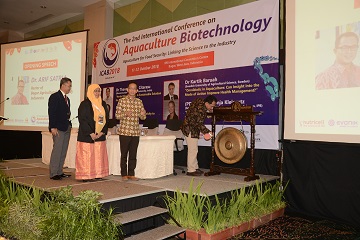Department of Aquaculture IPB Holds International Conference on Aquaculture Biotechnology

Department of Aquaculture (BDP), Faculty of Fisheries and Marine Sciences (FPIK) Bogor Agricultural University (IPB) held an International Scientific Conference. The event which was held at the IPB International Convention Center (IICC), Bogor (11/10) was promoting the theme of "Aquaculture for Food Security: Linking the Science to the Industry”.
In the opening, Dr. Sri Nuryati as Head of the Committee expressed the important role of aquaculture in supplying global food. To meet the demand for aquatic products, aquaculture must be developed towards industrialization. This includes improving the quality and competitiveness of the market. "It is necessary to create more aquaculture entrepreneurs who compete in the global market," she said.
She further said, Biotechnology is considered effective and efficient in increasing food production, production processes and product quality. In the field of aquaculture itself, the application of biotechnology supports the aquaculture industry to increase production efficiently, develop good quality, competitive prices, and environmentally friendly feed. The application of biotechnology is also oriented towards improving the health of aquatic organisms, optimizing water quality in aquaculture systems and improving genetics and reproductive systems in aquaculture.
Meanwhile, Dr. Drajat Martianto as Vice Rector of Education and Student Affairs who represented the Rector of IPB said that the theme of this discussion was important and relevant to the present problem. Indonesia still has malnutrition problems. The biggest example is stunting (short), this is also related to the consumption pattern of the Indonesian people where consumption of animal products is still low.
"Therefore, it is important to increase the role of fishery products because we cannot also depend on land animal products, because we still have many poor people. So, to improve consumption patterns and overcome nutritional problems can be done by providing nutritious food from fishery products. To produce one kilogram of fish requires one kilogram of temporary feed to produce one kilogram of beef, for example, requiring 12-15 kilograms of feed, which causes the price to be expensive for the poor. So, this discussion will be a good way for the government to get a recommendations to overcome the problem of malnutrition," he said.
From 2006 to 2014, the BDP department has five times held the National Aquaculture Biotechnology Symposium, and since 2016 its implementation has been upgraded to the International Conference on Aquaculture Biotechnology (ICAB). Present on this occasion were participants from various backgrounds, namely universities, research institutions, students, government agencies, entrepreneurs and stakeholders related to aquaculture.
As the main speaker, the BDP department presents researchers and experts in aquaculture and industrial biotechnology from various countries. Among them are Dr. Thavasimuthu Citarasu from Manonmaniam Sundaranar University, who discussed "Herbal Biomedicines: A Sustainable Solution for Aquaculture Industry”, Prof. Dr. Yuji Oshima from Kyushu University of Japan who discussed Fish Environmental Science, Dr. Kartik Baruah from the Swedish University of Agricultural Sciences of Sweden discussed Crustacean Microbiology and Immunology, and Dr. Habil Sonja Kleinertz from DAAD Fellow Faculty of Fisheries and Marine Science IPB discussed Use and Control Parasites in Mariculture.
The results of research submitted by various universities and research institutions cover various aspects of biotechnology in aquaculture. Such as production systems, fish and reproductive genetics, fish nutrition, fish health management, environmental management of cultivation, and cultivation systems and management. The hope is that this conference will be a facility for discussion, dissemination and dissemination of new findings from the results of research in the field of aquaculture. (RYS)



